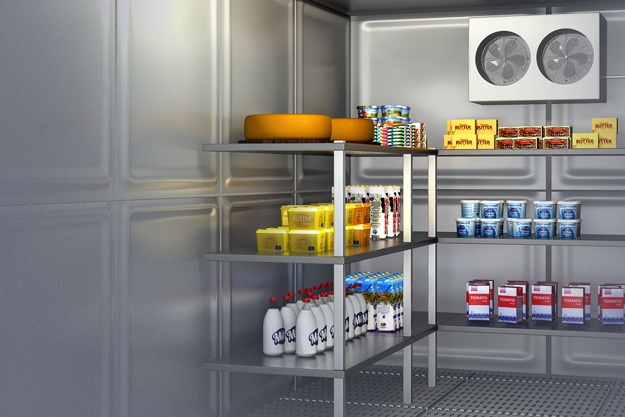In the realm of modern industry and technology, there exist numerous innovations that play pivotal roles in enhancing efficiency, preserving quality, and ensuring safety. Among these innovations, cold rooms stand out as indispensable assets for businesses across various sectors. Whether in food storage, pharmaceuticals, biotechnology, or logistics, cold rooms play a crucial role in maintaining optimal conditions for perishable goods. In this comprehensive exploration, we delve into the significance of cold rooms, their applications, and why they are essential in today's dynamic business landscape.
Understanding Cold Rooms
A cold room, also known as a refrigerated room or cold storage, is a controlled environment designed to maintain low temperatures for the storage of perishable items. These rooms are equipped with specialized cooling systems that regulate temperatures according to specific requirements, ensuring that products such as food, medicines, and chemicals remain fresh and viable for extended periods.
Importance in Food Storage and Preservation
One of the primary applications of cold rooms is in the food industry. Cold rooms play a critical role in preserving perishable food items such as fruits, vegetables, dairy products, and meats. By maintaining low temperatures, typically ranging from -18°C to 4°C (0°F to 39°F), cold rooms slow down the growth of bacteria and microorganisms, thereby extending the shelf life of food products and reducing waste.
In addition to storage, cold rooms also facilitate the transportation of perishable goods over long distances. Refrigerated trucks and containers equipped with cold room technology ensure that food items remain fresh and safe during transit, enabling businesses to reach distant markets without compromising on quality.
Ensuring Pharmaceutical Safety and Efficacy
Beyond the food industry, cold rooms play a crucial role in pharmaceutical storage and distribution. Many medications, vaccines, and biological products require strict temperature control to maintain their potency and efficacy. Cold rooms provide the ideal environment for storing pharmaceutical products, safeguarding their integrity and ensuring that patients receive medications that meet the highest standards of safety and effectiveness.
For laboratories and research facilities involved in biotechnology and life sciences, cold rooms are indispensable assets. These rooms create optimal conditions for storing biological samples, reagents, and sensitive materials, preserving their stability and allowing researchers to conduct experiments with confidence.
Cold Rooms Available for Sale: Choosing the Right Solution
For businesses and organizations in need of cold storage solutions, a crucial consideration is the availability of cold rooms for sale. Investing in a high-quality cold room can significantly impact operational efficiency and product quality. Here are three key factors to consider when selecting a cold room:
- Customization: Look for suppliers that offer customizable cold room solutions tailored to your specific requirements. Whether you need a small-scale cold room for a restaurant or a large-scale facility for a pharmaceutical warehouse, customization ensures that the cold room meets your space, temperature, and storage capacity needs.
- Energy Efficiency: Opt for cold rooms equipped with energy-efficient cooling systems. Energy-efficient technologies not only reduce operating costs but also contribute to sustainability efforts by minimizing energy consumption and environmental impact.
- Reliability and Support: Choose a reputable supplier known for delivering reliable cold room systems and providing excellent customer support. A reliable cold room ensures consistent temperature control, preventing costly losses due to equipment malfunctions or temperature fluctuations.
By prioritizing these factors and exploring available options, businesses can acquire cold rooms that enhance productivity, protect valuable assets, and meet regulatory requirements.
The Role of Cold Rooms in Logistics and Supply Chain Management
In the realm of logistics and supply chain management, cold rooms play a vital role in ensuring the seamless flow of perishable goods from production facilities to end consumers. Cold storage warehouses act as strategic hubs where temperature-sensitive products are stored, sorted, and dispatched according to demand.
Cold room technology integrates seamlessly with advanced logistics systems, allowing for real-time monitoring of temperature conditions, inventory levels, and shipment statuses. This level of visibility and control enables companies to optimize their supply chains, minimize waste, and deliver fresher products to customers.
Enhancing Food Safety and Compliance
In an era of increasing food safety regulations and consumer awareness, cold rooms are instrumental in ensuring compliance with industry standards and regulations. By maintaining precise temperature controls and implementing robust monitoring systems, businesses can uphold food safety protocols and earn consumer trust.
Cold rooms also play a crucial role in preserving the quality attributes of food products, such as taste, texture, and nutritional value. Whether it's storing fresh produce, frozen goods, or temperature-sensitive ingredients, cold rooms contribute significantly to maintaining food quality throughout the supply chain.
Cold Rooms in Emerging Industries and Innovations
The significance of cold rooms extends beyond traditional applications, with emerging industries and innovations harnessing cold storage technology for novel purposes. In sectors such as horticulture and agriculture, cold rooms are used to store seeds, bulbs, and plant specimens, preserving genetic diversity and supporting research and breeding programs.
Furthermore, cold rooms play a crucial role in the burgeoning field of cellular agriculture, where companies are developing lab-grown meat and other animal products. These innovative solutions rely on precise temperature control to cultivate cell cultures and produce sustainable alternatives to traditional animal agriculture.
Conclusion:
In conclusion, cold rooms represent a cornerstone of modern industry, supporting a wide range of applications and driving innovation across various sectors. From preserving food freshness to ensuring pharmaceutical efficacy, cold rooms play an indispensable role in maintaining product quality, enhancing safety, and optimizing supply chains. As businesses continue to prioritize sustainability, efficiency, and compliance, the demand for advanced cold storage solutions will only grow. By understanding the significance of cold rooms available for sale and leveraging available technologies, organizations can navigate complex challenges, seize new opportunities, and deliver superior products and services to consumers worldwide.


No comments yet